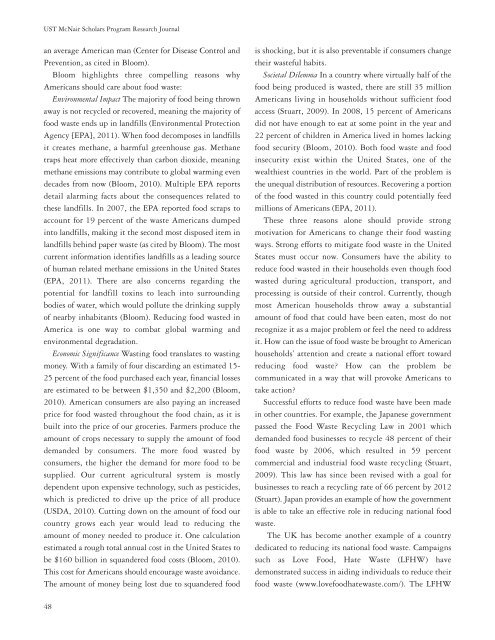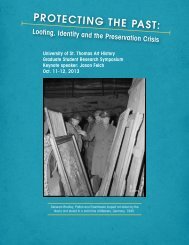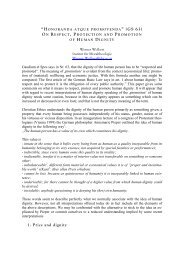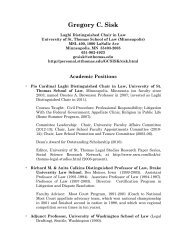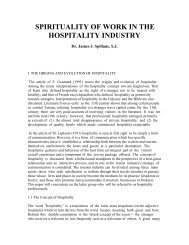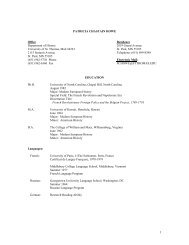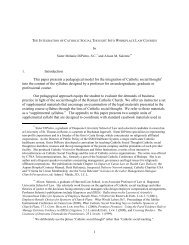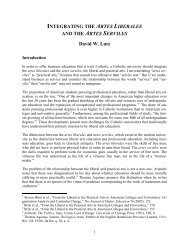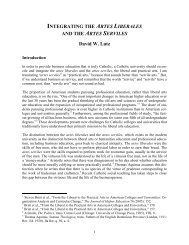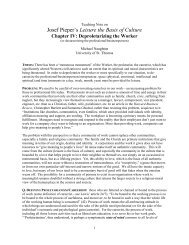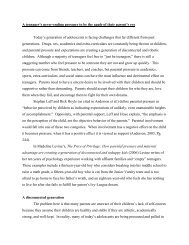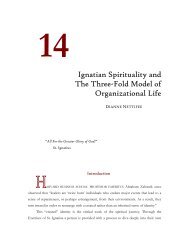dr. ronald e. mcnair acknowledgements - University of St. Thomas
dr. ronald e. mcnair acknowledgements - University of St. Thomas
dr. ronald e. mcnair acknowledgements - University of St. Thomas
Create successful ePaper yourself
Turn your PDF publications into a flip-book with our unique Google optimized e-Paper software.
UST McNair Scholars Program Research Journal<br />
an average American man (Center for Disease Control and<br />
Prevention, as cited in Bloom).<br />
Bloom highlights three compelling reasons why<br />
Americans should care about food waste:<br />
Environmental Impact The majority <strong>of</strong> food being thrown<br />
away is not recycled or recovered, meaning the majority <strong>of</strong><br />
food waste ends up in landfills (Environmental Protection<br />
Agency [EPA], 2011). When food decomposes in landfills<br />
it creates methane, a harmful greenhouse gas. Methane<br />
traps heat more effectively than carbon dioxide, meaning<br />
methane emissions may contribute to global warming even<br />
decades from now (Bloom, 2010). Multiple EPA reports<br />
detail alarming facts about the consequences related to<br />
these landfills. In 2007, the EPA reported food scraps to<br />
account for 19 percent <strong>of</strong> the waste Americans dumped<br />
into landfills, making it the second most disposed item in<br />
landfills behind paper waste (as cited by Bloom). The most<br />
current information identifies landfills as a leading source<br />
<strong>of</strong> human related methane emissions in the United <strong>St</strong>ates<br />
(EPA, 2011). There are also concerns regarding the<br />
potential for landfill toxins to leach into surrounding<br />
bodies <strong>of</strong> water, which would pollute the <strong>dr</strong>inking supply<br />
<strong>of</strong> nearby inhabitants (Bloom). Reducing food wasted in<br />
America is one way to combat global warming and<br />
environmental degradation.<br />
Economic Significance Wasting food translates to wasting<br />
money. With a family <strong>of</strong> four discarding an estimated 15-<br />
25 percent <strong>of</strong> the food purchased each year, financial losses<br />
are estimated to be between $1,350 and $2,200 (Bloom,<br />
2010). American consumers are also paying an increased<br />
price for food wasted throughout the food chain, as it is<br />
built into the price <strong>of</strong> our groceries. Farmers produce the<br />
amount <strong>of</strong> crops necessary to supply the amount <strong>of</strong> food<br />
demanded by consumers. The more food wasted by<br />
consumers, the higher the demand for more food to be<br />
supplied. Our current agricultural system is mostly<br />
dependent upon expensive technology, such as pesticides,<br />
which is predicted to <strong>dr</strong>ive up the price <strong>of</strong> all produce<br />
(USDA, 2010). Cutting down on the amount <strong>of</strong> food our<br />
country grows each year would lead to reducing the<br />
amount <strong>of</strong> money needed to produce it. One calculation<br />
estimated a rough total annual cost in the United <strong>St</strong>ates to<br />
be $160 billion in squandered food costs (Bloom, 2010).<br />
This cost for Americans should encourage waste avoidance.<br />
The amount <strong>of</strong> money being lost due to squandered food<br />
48<br />
is shocking, but it is also preventable if consumers change<br />
their wasteful habits.<br />
Societal Dilemma In a country where virtually half <strong>of</strong> the<br />
food being produced is wasted, there are still 35 million<br />
Americans living in households without sufficient food<br />
access (<strong>St</strong>uart, 2009). In 2008, 15 percent <strong>of</strong> Americans<br />
did not have enough to eat at some point in the year and<br />
22 percent <strong>of</strong> chil<strong>dr</strong>en in America lived in homes lacking<br />
food security (Bloom, 2010). Both food waste and food<br />
insecurity exist within the United <strong>St</strong>ates, one <strong>of</strong> the<br />
wealthiest countries in the world. Part <strong>of</strong> the problem is<br />
the unequal distribution <strong>of</strong> resources. Recovering a portion<br />
<strong>of</strong> the food wasted in this country could potentially feed<br />
millions <strong>of</strong> Americans (EPA, 2011).<br />
These three reasons alone should provide strong<br />
motivation for Americans to change their food wasting<br />
ways. <strong>St</strong>rong efforts to mitigate food waste in the United<br />
<strong>St</strong>ates must occur now. Consumers have the ability to<br />
reduce food wasted in their households even though food<br />
wasted during agricultural production, transport, and<br />
processing is outside <strong>of</strong> their control. Currently, though<br />
most American households throw away a substantial<br />
amount <strong>of</strong> food that could have been eaten, most do not<br />
recognize it as a major problem or feel the need to ad<strong>dr</strong>ess<br />
it. How can the issue <strong>of</strong> food waste be brought to American<br />
households’ attention and create a national effort toward<br />
reducing food waste? How can the problem be<br />
communicated in a way that will provoke Americans to<br />
take action?<br />
Successful efforts to reduce food waste have been made<br />
in other countries. For example, the Japanese government<br />
passed the Food Waste Recycling Law in 2001 which<br />
demanded food businesses to recycle 48 percent <strong>of</strong> their<br />
food waste by 2006, which resulted in 59 percent<br />
commercial and industrial food waste recycling (<strong>St</strong>uart,<br />
2009). This law has since been revised with a goal for<br />
businesses to reach a recycling rate <strong>of</strong> 66 percent by 2012<br />
(<strong>St</strong>uart). Japan provides an example <strong>of</strong> how the government<br />
is able to take an effective role in reducing national food<br />
waste.<br />
The UK has become another example <strong>of</strong> a country<br />
dedicated to reducing its national food waste. Campaigns<br />
such as Love Food, Hate Waste (LFHW) have<br />
demonstrated success in aiding individuals to reduce their<br />
food waste (www.lovefoodhatewaste.com/). The LFHW


